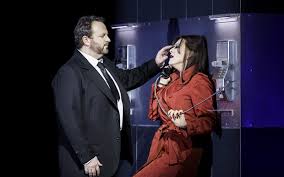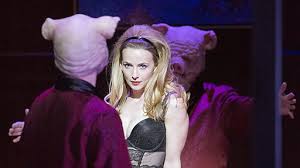Milton Keynes, 12-13 March 2014
Experiencing Mariusz Trelinski’s productions of Puccini’s Manon Lescaut and Henze’s Boulevard Solitude together made more sense than seeing them individually. The cross references between the two versions deepen our understanding of both and also give us a better insight into the approach of the composers. We seem to follow the narrative through De Grieux’s eyes in Puccini but Manon’s in Henze. The archly romantic writing of the earlier composer is in keeping with Des Grieux’s approach to life. He takes Manon at her word and is endlessly forgiving to the point of death. His life, as we see it in its final hours, is a constant recycling of events to the point where time literally stops and he is living in a fantasy now totally divorced from the reality around him.
For Henze, Manon is too close to Lulu for comfort, destroying those who cross her path and managing somehow to outlast the men who die around her.
The video projections by Batek Macias may be uncomfortable on the eyes but bring us a harsh reality which dehumanises everything it touches. Only the death of Manon in the ‘wilderness’ has any slight comfort, but then that itself is a delusion.
Throughout, both productions were finely sung and sumptuously accompanied from the pit under Lothar Koenigs. Gwyn Hughes Jones produced the ringing tones needed for Des Grieux but was strongly contrasted by the darker tones of David Kempster as Lescaut and Stephen Richardson as Geronte. Smaller parts were taken by regular company members, again highlighting the strength of the ensemble.
In Boulevard Solitude Jason Bridges brought us a younger Armand but one who is far more at risk. He may have the classical references but he is easily seduced by drugs and drink. Benjamin Bevan’s Lescaut is a far more sleazy individual though Adrian Thompson brings unexpected nobility to Lilaque.
The two Manon’s are equally well contrasted. Chiara Taigi’s Manon for the Puccini may not be romantically conventional but there is no assumption that she is already debauched before she meets Des Grieux. She is an opportunist who moves as the world provides, but is destroyed all too easily by it. Her ample tones filled out Puccini’s musical lines with ease.
Sarah Tynan’s creation for Henze is more worldly wise, with a steely edge, which she does not lose until the final moments when she shoots Lilaque – though the on-going repetition of this moment is highly effective. She sings with a crispness and clarity which conveyed the English text with ease.
David Poutney’s approach of providing linked productions within a season is proving to be very valuable. The next series on Faith should prove equally stimulating.


